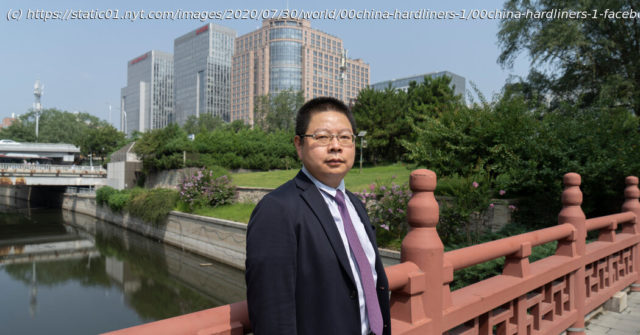Chinese academics have been honing the Communist Party’s authoritarian response in Hong Kong, rejecting the liberal ideas of their youth.
When Tian Feilong first arrived in Hong Kong as demands for free elections were on the rise, he said he felt sympathetic toward a society that seemed to reflect the liberal political ideas he had studied as a graduate student in Beijing.
Then, as the calls escalated into protests across Hong Kong in 2014, he increasingly embraced Chinese warnings that freedom could go too far, threatening national unity. He became an ardent critic of the demonstrations, and six years later he is a staunch defender of the sweeping national security law that China has imposed on the former British colony.
Mr. Tian has joined a tide of Chinese scholars who have turned against Western-inspired ideas that once flowed in China’s universities, instead promoting the proudly authoritarian worldview ascendant under Xi Jinping, the Communist Party leader. This cadre of Chinese intellectuals serve as champions, even official advisers, defending and honing the party’s hardening policies, including the rollout of the security law in Hong Kong.
“Back when I was weak, I had to totally play by your rules. Now I’m strong and have confidence, so why can’t I lay down my own rules and values and ideas?” Mr. Tian, 37, said in an interview, explaining the prevailing outlook in China. Witnessing the tumult as a visiting scholar in Hong Kong in 2014, Mr. Tian said, he “rethought the relationship between individual freedom and state authority.”
“Hong Kong is, after all, China’s Hong Kong,” he said. “It’s up to the Communist Party to clean up this mess.”
While China’s Communist Party has long nurtured legions of academics to defend its agenda, these authoritarian thinkers stand out for their unabashed, often flashily erudite advocacy of one-party rule and assertive sovereignty, and their turn against the liberal ideas that many of them once embraced.
They portray themselves as fortifying China for an era of deepening ideological rivalry. They describe the United States as a dangerous, overreaching shambles, even more so in the wake of the coronavirus pandemic. They oppose constitutional fetters on Communist Party control, arguing that Western-inspired ideas of the rule of law are a dangerous mirage that could hobble the party.
They argue that China must reclaim its status as a world power, even as a new kind of benign empire displacing the United States. They extol Mr. Xi as a historic leader, guiding China through a momentous transformation.
A number of these scholars, sometimes called “statists,” have worked on policy toward Hong Kong, the sole territory under Chinese rule that has been a stubborn enclave for pro-democracy defiance of Beijing. Their proposals have fed into China’s increasingly uncompromising line, including the security law, which has swiftly curbed protests and political debate.
“We ignore these voices at our own risk,” said Timothy Cheek, a historian at the University of British Columbia who helps run Reading the China Dream, a website that translates works by Chinese thinkers. “They give voice to a stream of Chinese political thought that is probably more influential than liberal thought.”
As well as earnestly citing Mr. Xi’s speeches, these academics draw on ancient Chinese thinkers who counseled stern rulership, along with Western critics of liberal political traditions.






